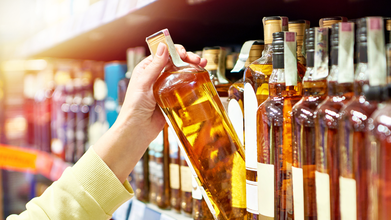- Health Conditions A-Z
- Health & Wellness
- Nutrition
- Fitness
- Health News
- Ayurveda
- Videos
- Medicine A-Z
- Parenting
Sleep Better Tonight With This One Snack Experts Swear By

Image Credit: Canva
Having trouble sleeping? Sometimes, it's what you eat before bed that makes all the difference. While cookies and chips may be tempting, experts say you should reach for something that can actually improve your sleep quality. Enter edamame: the humble soybean packed with a sleep-promoting nutrient that can help you drift off with ease. Edamame is now becoming increasingly popular as a bedtime snack that promotes healthy sleep patterns due to the presence of tryptophan, a vital amino acid in the synthesis of melatonin.
In this article, let's discuss why edamame is a sleep game-changer, the science behind its benefits, and some tips for bringing it into your nighttime routine.
Edamame, or young soybeans that are harvested before they are fully ripe, is a plant-based powerhouse. These bright green beans are naturally gluten-free, low in calories, and cholesterol-free. Beyond being a versatile snack, they are loaded with essential nutrients like protein, iron, calcium, and most notably, tryptophan.
It's also important in the production of melatonin, the hormone responsible for our sleep-wake cycle. According to the National Library of Medicine, consumption of tryptophan-rich foods such as edamame can significantly enhance sleep quality through the body's natural production of melatonin.
A 2021 review in Annual Review of Nutrition outlines the relationship between tryptophan-rich diets and improved sleep. People who eat foods rich in this amino acid sleep well and report good quality of sleep compared to those who don't.
One cup of boiled edamame contains 416 milligrams of tryptophan, thus more than the daily amount required. While other protein sources contain tryptophan, like turkey or salmon, edamame offers a light, plant-based alternative that one can take as a snack just before sleep.
How to Add Edamame into Your Bedtime Routine
To avoid disrupting your sleep, moderation is key. Experts suggest sticking to half a cup to one cup of edamame at least three hours before bedtime. This ensures your body has enough time to digest, reducing the risk of discomfort or acid reflux.
While there’s no exact timeframe for consuming tryptophan-rich foods, eating edamame in the evening gives your body ample time to convert tryptophan into melatonin. Pairing this with consistent sleep hygiene—like maintaining a dark, quiet room and a regular bedtime—will maximize its benefits.
Also Read: Manage Acid Reflux At Night With 5 Simple Tips For Better Sleep
Is Edamame the Same as Soybeans?
Yes, edamame is essentially young soybeans. The difference lies in when they're harvested. Edamame is picked before the beans mature, making them tender and slightly sweet. They can be eaten boiled, steamed, or roasted, either in their pods or shelled.
Creative Ways to Enjoy Edamame Before Bed
1. Simple Salted Edamame
Steam one cup of edamame pods in 5-10 minutes. Allow to cool a bit and drizzle with sea salt. Serve warm and enjoy the edible pods as an indulgent but low-calorie snack. Edamame Hummus
Ingredients:
- 1 cup of shelled edamame
- 2 tablespoons tahini
- 2 tablespoons olive oil
- 1 garlic clove, peeled
- Juice of 1 lemon
- Salt to taste
Instructions:
1. Puree all ingredients in a food processor until smooth.
2. Add water as needed for your desired consistency.
3. Serve with whole-grain crackers or veggie sticks.
Health Benefits Beyond Sleep
Nutrition
Edamame offers more than just better sleep. Its nutrient profile includes:
- Protein: A plant-based source that supports muscle repair and growth.
- Iron: Involved in oxygen transport and energy production.
- Calcium: Bone health and nerve function.
Weight Management
Low in calories, high in protein, edamame is a great food for weight management. The fiber keeps you full so you are less likely to sneak into the kitchen at midnight to grab a snack.
Heart Health
The unsaturated fats in edamame help lower cholesterol, which helps with heart health.
Tips To Consider Before Buying Edamame
When purchasing edamame, opt for fresh or frozen without added ingredients. Most grocery stores carry them in the produce or frozen food sections. Make sure the label only lists "edamame" as the ingredient for the healthiest option.
While edamame is by no means the "sleep" remedy, this dish is super delicious, fun, and incredibly nourishing so your body should react positively in improving its sleeping schedule. Therefore, it will perhaps be this single change towards improved sleep through using edamame as your final snack to snack on prior to bed-time can help a good night sleep coupled with a good environment around you that guarantees you're up and strong tomorrow.
Sleep and Diet: Mounting Evidence of a Cyclical Relationship. Annu Rev Nutr. 2021
Winter Cold And Congestion? Here’s How A Hot Toddy Can Help

Credits: Canva
Folklore has long suggested that a hot toddy, the warm alcoholic drink made with hot water, lemon juice, honey, and spirits such as whiskey, rum, or brandy, can ease a sore throat or help clear congestion caused by a winter cold. Many people swear by it. But what exactly is a hot toddy, and how does it work when you are dealing with cold and congestion?
What Is A Hot Toddy?
Hot toddy is a popular winter drink, especially during colder months. It is a traditional mix of whiskey or rum, hot water, honey, lemon, and warming spices like cinnamon or cloves. The drink helps warm the body, offers comfort in chilly weather, and may support the body during seasonal illnesses such as colds and flu.
Each ingredient plays a role. Honey is known for its natural antibacterial properties, while lemon provides vitamin C to support immune health. Alcohol acts as a mild vasodilator, which helps improve blood flow, and spices aid digestion while easing congestion. Together, these elements make hot toddy a soothing, natural option for winter discomfort.
That said, moderation is key. One serving, or at most two, especially in the evening, may help with sleep, stress, congestion, sore throat, and general discomfort. Below are some potential health benefits of drinking a hot toddy during winter.
Hot Toddy Health Benefits
1. Soothes Sore Throat and Cough
A hot toddy can feel deeply comforting when your throat is irritated during winter. The heat from the water, combined with honey, helps coat the throat and calm inflamed tissues. This can ease irritation caused by dry air or colds. Honey’s antibacterial qualities support healing, while lemon adds vitamin C to help the immune system. A small amount of whiskey or rum may further relax throat muscles, making coughing and swallowing less uncomfortable.
2. Boosts Immunity During Winter
Winter often brings frequent infections, but a hot toddy may help strengthen the body’s natural defences. Vitamin C from lemon supports white blood cells that fight viruses common in colder months. Honey provides antioxidants and enzymes that assist overall immunity. The warmth of the drink increases circulation, helping immune cells move efficiently through the body. Spices such as cinnamon or ginger offer anti-inflammatory benefits that may reduce the risk of infection. Having this drink before bedtime can support the body during seasonal changes.
3. Relieves Congestion and Clears Sinuses
Blocked noses are a common winter complaint, often caused by cold air outside and dry heating indoors. The steam from a hot toddy can help loosen mucus in the sinuses and nasal passages. Lemon’s acidity may help break down phlegm, while alcohol slightly widens blood vessels, which can ease congestion. Slowly inhaling the vapour can help open airways and make breathing more comfortable.
4. Warms You Inside Out
Few things fight winter chills better than a warm drink. Hot toddy raises your core temperature, helping warmth spread through the body. Alcohol encourages better circulation, especially to hands and feet that often feel cold. Ingredients like ginger or cloves add a warming effect by gently increasing metabolic heat.
5. Relaxation and Better Sleep
Winter stress, shorter days, and busy schedules can interfere with sleep. A hot toddy in moderation may help the body relax. Alcohol has a calming effect that can slow mental activity and ease restlessness. Honey may help stabilise blood sugar levels overnight, reducing sleep interruptions. The warmth of the drink also signals the body to wind down and prepare for rest.
Can A Hot Toddy Help With A Cold?
There is no cure for the common cold. Most people manage symptoms through home remedies and over-the-counter medicines. Honey is known for its anti-inflammatory effects, and lemon contains antioxidants that support health. However, no scientific studies have directly proven that hot toddies treat colds.
That said, according to Medical News Today, many people believe that a hot toddy can help ease common cold symptoms, including:
- runny nose
- sore throat
- sneezing
- fever
- body aches
- headache
- fatigue
- cough
While it may not cure a cold, a hot toddy can offer comfort and temporary relief during the winter months when used responsibly.
Could This Popular Drink Really Help Lower Blood Pressure And Protect Your Heart?

Credits: Canva
A simple drink costing just 22p per serving could benefit your heart. Recent research suggests that orange juice may help reduce blood pressure and inflammation, which are two major risk factors for cardiovascular disease.
Cardiovascular Disease: A Growing Concern In The UK
Cardiovascular disease remains a leading health concern in the UK, responsible for roughly a quarter of all deaths each year. This umbrella term covers conditions affecting the heart and blood vessels, including coronary artery disease, stroke, heart failure, and irregular heart rhythms.
While medications exist to manage these conditions, health authorities recommend lifestyle adjustments as well. Among these, dietary changes are crucial, particularly reducing foods high in saturated fats.
Orange Juice Shows Promise for Heart Health
New research from the University of São Paulo in Brazil, published in Molecular Nutrition and Food Research, has revealed that orange juice can influence genes linked to high blood pressure and inflammation. These are key contributors to heart attacks, strokes, and heart failure.
Inflammation can damage blood vessels, constrict arteries, and promote plaque buildup. Orange juice was also shown to enhance genes involved in fat metabolism, supporting better processing and storage of fats in the body.
Layanne Nascimento Fraga, the study’s lead author, told Medical News Today: “We used a transcriptomic approach to observe the effects of orange juice on the entire metabolic system, allowing us to see multiple pathways working together. We found improvements in key cardiometabolic markers, including blood pressure, inflammation, oxidative stress, and lipid metabolism.”
The study identified 1,705 genes affected by orange juice, with 98% being downregulated, highlighting its broad impact on cardiovascular health.
Personalised Benefits and Nutrigenomics
The researchers noted that orange juice’s effects can vary based on an individual’s body weight. This provides insights for tailored dietary recommendations, particularly regarding flavonoid-rich foods like citrus. At the time of reporting, a litre of orange juice from Tesco cost 89p, making a 250ml serving roughly 22p.
Supporting Evidence from Other Studies
This is not the first time orange juice has been linked to heart health. A 2023 study in Lipids in Health and Disease found that consuming two glasses (480ml) daily for at least a year led to significantly lower cholesterol levels in participants aged 18–66.
A meta-analysis reviewing nine studies also suggested that orange juice may improve levels of “bad” LDL cholesterol, though effects on total cholesterol and “good” HDL cholesterol were not significant.
A 2021 study in the European Journal of Nutrition further showed that hesperidin-enriched orange juice could reduce systolic blood pressure and pulse pressure, offering a potential tool for managing pre- and stage-1 hypertension.
It is important to remember that orange juice contains roughly 24 grams of sugar per serving, which should be considered when incorporating it into a daily diet, especially for those monitoring sugar intake.
How Long Does It Take To Detox From Alcohol?

Credits: iStock
It is that time of the year, when you will be partying, waking up hungover, and partying again. However, it is important to understand that such a habit takes a toll on you. How long alcohol stays in your body depends on how much you drank and how fast your system processes it. In general, the liver can break down roughly one standard drink per hour. Still, traces of alcohol can show up in tests even 24 hours later. A standard drink usually means about 12 ounces of beer, 4 ounces of wine, or 1 and a quarter ounces of distilled spirits. The more you drink, the longer your body needs to clear it.
Most of the alcohol you consume is processed by the liver. Small amounts leave through urine, sweat, and breath, but there is no shortcut to speed this up. Coffee, cold showers, or fancy detox drinks do not flush alcohol out faster. Time is the only real detox. Giving your liver space to do its job is key.
If someone has been drinking heavily for a long period and suddenly stops, detox can come with withdrawal symptoms. These can range from mild discomfort to serious complications. In some cases, withdrawal can be life threatening, which is why medical supervision is strongly advised for people with a history of heavy drinking.
How Long Can Alcohol Be Detected?
Alcohol stays detectable in the body for different lengths of time depending on the test used and individual factors like age, sex, body weight, food intake, and medications. Urine, breath, and blood tests can usually detect alcohol for 12 to 24 hours after drinking. Hair tests are different and may show alcohol use for up to 90 days.
In most parts of the United States, driving with a blood alcohol concentration of 0.08 grams per deciliter or higher is illegal because it affects judgment and vision. Utah has a lower legal limit of 0.05. Even if you feel sober, alcohol can still be present in your system.
What Happens During Alcohol Detox?
For people with alcohol use disorder or long term heavy drinking habits, withdrawal symptoms may start around eight hours after the last drink. These symptoms often peak between 24 and 72 hours and usually ease within five to seven days. Some psychological effects like anxiety or cravings can last longer.
Early symptoms often include nausea, anxiety, poor sleep, and stomach pain. More severe symptoms can involve high blood pressure, confusion, fever, hallucinations, or seizures. Because of these risks, detoxing in a medical setting is often the safest option. Doctors may prescribe medications to manage symptoms and prevent complications.
Tips for a Safer Detox
If you are cutting back or quitting alcohol, start by talking to a healthcare professional, especially if your drinking has been heavy. Take things one day at a time and focus on small, realistic goals. Choose a calm and supportive environment and avoid triggers that make you want to drink.
Hydration matters. Alcohol dehydrates the body, so water, herbal teas, and electrolyte drinks can help reduce headaches and fatigue. Nutrition also plays a big role. Balanced meals with fruits, vegetables, whole grains, and protein support recovery. Foods rich in B vitamins and magnesium are particularly helpful.
Avoid replacing alcohol with other substances like excessive caffeine or nicotine, as this can worsen stress and cravings. If you notice signs of alcohol dependence, reaching out for professional help is a strong and positive step. Detox is only the beginning, but with the right support, recovery is possible.
© 2024 Bennett, Coleman & Company Limited

